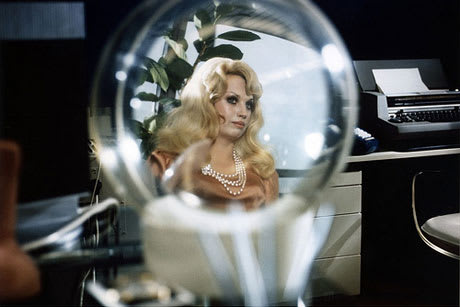Rainer Werner Fassbinder's World on a Wire always seems to be taking place in some bleak reception area, the kind where there's always a faint echo and classical music dins in the background, and the white, faux-leather chairs feel just a little too cold. Like Jean-Luc Godard with Alphaville, Fassbinder evokes his dystopian future, where an ominous super-corporation has perfected an all-encompassing reality simulator called "the Simulacron," by simply filming in the most ultra-modern and blandly functional sections of a city ― in this case, Munich, 1973. The passage of time has, if anything, enhanced the creepy, otherworldly ambience: all these square phones, orange chairs and appalling fur rugs really do suggest some kind of homogenized corporate hell.
Originally aired in two parts on German television, World on a Wire is one of the least known and most rarely screened of Fassbinder's 40-plus film and TV projects. A new 35-mm print, which premiered last year at the Museum of Modern Art, has been making the rounds at rep cinemas and seen today, it feels like one of those movies that's somehow both tied to its moment and ahead of its time.
Its navigation of reality and virtual reality obviously anticipates our Facebook/World of Warcraft era, the corporation could be any of our major media conglomerates and the reality-shifting technophobia anticipates and influences The Matrix, eXistenZ, Avatar, Blade Runner and just about any other grown-up sci-fi film.
But the world of World on a Wire is a pretty unpleasant place to spend 205 minutes, and those minutes don't exactly fly by. Fassbinder directs the convoluted "sci-fi thriller"― in which the newly installed Simulacron project director (Klaus Lowitsch) experiences glitches in his world, with the higher-ups conspiring against reality ― in a way that perversely strips it of thrills. Many of Fassbinder's stable of actors appear as bureaucrats and sexpots, all seemingly instructed to act with as little charisma and chemistry as possible. When characters flirt or attend parties, the acts feel rote, and the film's lone sexual encounter is immediately followed by a betrayal.
This, of course, doesn't mean that World on a Wire isn't worth your time. In its cold, sterile way, Fassbinder's universe has much of the same power as Alphaville and little of the escapism. And surely this is the only movie you'll see this year with a platonic conversation about whether a cup of coffee is really just the idea of a cup of coffee.
(Janus Films)Originally aired in two parts on German television, World on a Wire is one of the least known and most rarely screened of Fassbinder's 40-plus film and TV projects. A new 35-mm print, which premiered last year at the Museum of Modern Art, has been making the rounds at rep cinemas and seen today, it feels like one of those movies that's somehow both tied to its moment and ahead of its time.
Its navigation of reality and virtual reality obviously anticipates our Facebook/World of Warcraft era, the corporation could be any of our major media conglomerates and the reality-shifting technophobia anticipates and influences The Matrix, eXistenZ, Avatar, Blade Runner and just about any other grown-up sci-fi film.
But the world of World on a Wire is a pretty unpleasant place to spend 205 minutes, and those minutes don't exactly fly by. Fassbinder directs the convoluted "sci-fi thriller"― in which the newly installed Simulacron project director (Klaus Lowitsch) experiences glitches in his world, with the higher-ups conspiring against reality ― in a way that perversely strips it of thrills. Many of Fassbinder's stable of actors appear as bureaucrats and sexpots, all seemingly instructed to act with as little charisma and chemistry as possible. When characters flirt or attend parties, the acts feel rote, and the film's lone sexual encounter is immediately followed by a betrayal.
This, of course, doesn't mean that World on a Wire isn't worth your time. In its cold, sterile way, Fassbinder's universe has much of the same power as Alphaville and little of the escapism. And surely this is the only movie you'll see this year with a platonic conversation about whether a cup of coffee is really just the idea of a cup of coffee.
